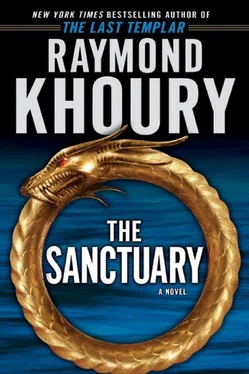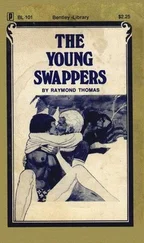Mia studied him as he processed the information. His face was still almost hermetically unreadable, but she could definitely sense some concern there. She flashed back to standing with him outside her mom’s front door and raised her eyes to meet his. With a slight hardening in her voice, she ventured another question.
“Outside Mom’s apartment. You said I already knew this was serious. And of course, it was, I know that, but the way you said it…” She paused for a moment. She knew she was right, and the conviction within her came through with blinding clarity. “You still haven’t told me everything. There’s more to this, isn’t there?”
He sat back and ran a hand through his hair, giving the back of his neck a small rub, then looked at her and seemed to reach a verdict. He leaned in, reached into his case, and pulled out his laptop. He flipped it open and powered it up, then placed his index finger on the small finger-print scanner before tapping some keys. The screen lit up. He navigated through it in silence, found the folder he needed, and turned to her.
“This is classified,” he informed her with a raised finger before pausing to take a breath, seemingly still debating whether he was making a mistake in sharing this with her.
He turned the screen to face her. It showed a photograph of what looked like a wall inside a narrow, cell-like room. Something circular, the size of an open umbrella judging by the scale of the light fixture overhead, was scratched into the wall. Mia recognized it instantly.
“I was stationed in Iraq in the first years of the war,” he explained. “One of our units got some intel about a doctor who was close to Saddam, but by the time they raided his compound, he was gone.”
A barrage of questions rose within Mia, but Corben wasn’t through.
“What they did find in his compound was pretty horrific. There was a huge lab in its basement. State-of-the-art operating chamber, the works. He was running experiments there, experiments that…” His voice drifted off for a moment as he chose his words, and a fleeting look of pain crossed his face, a pain Mia could hear in his voice. “He was experimenting on humans. Young and old. Male, female. Kids…”
Mia felt her blood chill as horror and concern for her mother consumed her in equal measure.
“There were holding cells in the compound, but everyone in them had been executed shortly before they were raided. We also found dozens of bodies buried in a field not far from the house,” he went on, “dumped in mass graves, naked. Many of them had been operated on. Some were missing body parts. There were stashes of organs, gallons of blood, stored in fridges. Some of their wounds, where he’d cut them open, weren’t sutured. He didn’t bothering closing them up once he’d taken out what interested him. There were other…more disturbing discoveries in the lab that I’ll spare you. He just used them like guinea pigs and tossed out what he didn’t need. It seems Saddam supplied him with them, along with everything else he needed.” Corben paused, as if to purge the images from his mind and collect himself. “This”—he pointed at the image of the Ouroboros on the laptop’s screen—“was carved into the wall of one of the holding cells.”
Mia felt a sudden wetness on her mouth and realized she’d unconsciously caught her lower lip with her teeth and bitten into it hard enough to draw blood. She released her bite and dabbed her lip with her finger, then rubbed the droplet away. “What kind of experiments was he running?”
“We’re not sure. But given Saddam’s interest in finding efficient ways to commit mass murder…”
Mia’s eyes rocketed wide. “You think he was working on a biological weapon?”
Corben shrugged. “The secrecy surrounding his work, the dead bodies, Saddam’s championing him…put it this way. I don’t think he was looking for a cure for cancer.”
Mia stared at the shot of the cell again. “But why the carving on the wall?”
“We don’t know. We managed to track down some people in Baghdad who came across him. I spoke to a dealer in antiquities, as well as a guy who used to be a curator at the National Museum. It seems this man, the hakeem as they called him, was fascinated by Iraqi history, turn of the millennium specifically. They said he knew a lot about it and had traveled extensively in the region. Once they felt comfortable opening up a bit more, they separately told me he’d asked them to look for any local references to the Ouroboros in ancient books and manuscripts.”
“Which, presumably, they did.”
“You bet,” Corben confirmed, “but they didn’t find anything. So he asked them to look some more, and to widen the search, even outside Iraq’s borders. And to keep looking. Which they did. They said he was completely obsessed with it, and they were both terrified of him.”
“And they found nothing?”
Corben shook his head.
“And now he wants this book…” Mia connected the dots in her mind. “So this…this doctor. He’s still out there.”
He nodded.
A devastating sense of dread choked Mia’s heart. “And you think he has my mom?” The words almost dried in her throat as she uttered them, willing the answer to be negative.
Corben’s somber look told her it wasn’t, but she knew that already. “His trail went cold north of Tikrit a few weeks after the discovery of the lab, and we haven’t had any leads since. Given that Evelyn had a connection to the Ouroboros through the chamber she found, and given the ruthlessness of whoever seems to be after the relics,” he said gravely, “I think it’s more than likely that either he’s got her or she’s being held by someone who’s linked to him in some way.”
Mia felt the air vacate her lungs. Her mom’s situation seemed horrible enough when she thought they were just — just — dealing with a gang of smugglers. This…this was too horrific to imagine.
She stared out into nothingness, her mind short-circuited by Corben’s grim revelation. The room seemed to darken around her, and everything in it shifted slightly out of focus. She sensed Corben picking up his phone and heard dialing tones at the periphery of her consciousness, followed by the same unanswered ringing tone as before and his phone snapping shut. It took a moment for her to emerge from her daze and register that he must have been trying Ramez’s number again.
A question drifted out of the fog. She turned to Corben. “Given all the fuss about WMDs and what you know about this man, I’d have thought you’d have a massive team of people on the case, working it with you. Surely, getting him is a huge priority, isn’t it?”
“It was,” Corben said glumly. “It’s not anymore. We cried wolf about WMDs once too often, and the word itself has become poison. We deserve as much, I guess, but no one wants to hear about them anymore, and if anything, the priority’s to disengage from Iraq, not commit more resources.”
“But he’s a monster,” Mia protested, clambering angrily to her feet.
“You think he’s the only one running around out there?” he countered with calm frustration. “There are plenty of other mass murderers out there, from Rwanda, Serbia, you name it — they’re living quietly in leafy suburbs of London or Brussels under assumed names, no one’s bothering them. The only people after them are investigative reporters. That’s it. They’re the new Simon Wiesenthals, and there aren’t that many of them, just a handful who care enough to devote their time and risk their lives tracking these butchers down. They’re the only ones making a difference. Once in a while, they’ll out one of them in a story that might get a few columns not too far from the front page, and some prosecutor will maybe pay attention and look into it if it creates enough of a stink, but generally, these guys get away.”
Читать дальше












